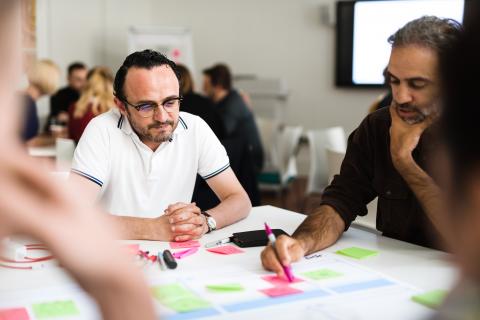Governance and collaboration for river restoration and blue-green infrastructure

On 21-22 June 2022, the Policy Learning Platform held an online peer review for the Municipality of Quart de Poblet, which requested advice regarding their policy challenge of governance and collaboration for river restoration and blue green infrastructure.
A detailed description of the challenge and recommendations can be found in the follow-up report.
Current state of affairs
The Municipality of Quart de Poblet is located in the central coastal part of the Valencian Community, in Spain. The river Túria plays an important role in Quart de Poblet as it provides green areas and significant ecological value for passive leisure, contemplation of nature and environmental awareness.
Quart de Poblet’s Town Council, in collaboration with the LIMNE Foundation, wished to improve the governance structure of the river courses and their surroundings, as part of the town’s Green Infrastructure Plan focusing on biodiversity restoration and conservation of rivers, wetlands and their surrounding landscapes.
The long-term management, restoration and conservation of these sensitive ecosystems involves a wide range of parties and needs to take into account technical, legal and public policy governance aspects.
To address the challenges related to governance and improve existing policies for the fluvial landscape and wetlands, Quart de Poblet and LIMNE foundation have shown interest in the experience of other regions and municipalities to get a better understanding of:
- How to structure a strategic governance framework for a more effective collaboration of river management and restoration, in the context of the green infrastructure, between different public administrations, and in parallel between these administrations, non-profits and other social actors
- What specific tools can be improved and innovated for public-social-private partnerships towards long-term collaboration in management, restoration and conservation of river ecosystems and the blue-green infrastructure
Peers from across Europe
Alongside Magda Michaliková and Astrid Severin, our environment and resource efficiency Thematic Experts, four excellent peers were invited, and participated in the peer review:
- Alexandra Maccario, Ville de Cagnes-sur-Mer, France
- Constanze O'Toole, The Rivers Trust, Ireland
- Francesco Scorza, University of Basilicata, Italy
- Jose Ramon Díez López, University of the Basque Country, Spain
The experts came together to share their experience and to provide recommendations for ways of tackling Quart de Poblet’s challenges related to governance and collaboration for river restoration.
They provided the host with valuable insight, know-how, and practical suggestions for solving the challenges presented above.
Recommendations
The peers presented different governance frameworks, shared tips, and success factors for structuring collaboration across different institutions.
They also described various tools for public-social-private partnerships such as multi-stakeholder consultations, citizen participation, communication and building of the local territorial narrative, involvement of catchment organisations, data sharing, or stakeholder engagement events.
The peers recommended the host to ensure a data and evidence approach allowing informed decision-making, benchmarking, monitoring, and control of processes and activities.
They also suggested pursuing an integrated approach combining river restoration and flood prevention, to empower local communities through trainings, events, co-creation activities and codesign to boost public participation and a bottom-up approach.
The “democratisation” of community involvement is important to increase understanding of the needs and objectives of key stakeholder groups.
Finally, reinforcing and developing partnerships with other European catchment areas allows to stay up to date and exchange practices across different areas sharing similar challenges and solutions.
Further suggestions
The peers also suggested to:
- use the private sector and tap into local knowledge,
- offer trainings / education / social learning on river restoration emphasising the value of eco-systems services,
- invest in a participatory process to jointly develop a ‘river’ (road)map connecting the whole space of the river (agriculture, industry, heritage),
- assess and review different potential organisational models and roles for LIMNE
- implement a mix of different funding streams to finance core activities (tenders, grants, sponsorships, publications, volunteers, crowd-funding),
- provide sufficient long-term funding for the local community groups (through public money),
- co-develop and co-implement funds with the community, and focus on a more hollistic approach.
The host’s policy challenges, and all the peer suggestions can be found in the follow-up report.
Pleased with the outcome of two full days of intense discussions moderated by the Policy Learning Platform Juan Medina, Town Councillor of Environment from Quart de Poblet, and from the side of the peers, José Ramon Díez López, from University of the Basque Country, Spain commented:
Thank you for your expert contributions and local experience. We have learned about new tools and identified a need to increase literacy in areas such as eco-systems services and river restoration. We need to rediscover the old course of the river, which is now hidden and damaged. Due to 22 years of experience and its location, we can play a key role and lead the initiative in the region. You have presented really useful tools and made us even more committed to the mission.
I am really satisfied with the peer review. Thanks to the PLP and thanks to the hosts, all the colleagues and the translators. I had reservations and doubts about the process, but in a miraculous way, you compiled and shared our recommendations. I bring home many lessons learned that will help to improve water, land and people involvement in my region as well.
The host used the peer review to involve local stakeholders in a very lively discussion and is now assessing the recommendations received from the peers to see how they could inform the decision-making process to improve the governance and collaboration for river restoration.
Peer Review Report Quart de Poblet
Follow-up report of the peer review in Quart de Poblet
Apply for a peer review
Find solutions to your policy challenges with our experts and peers during a two-day peer review.


